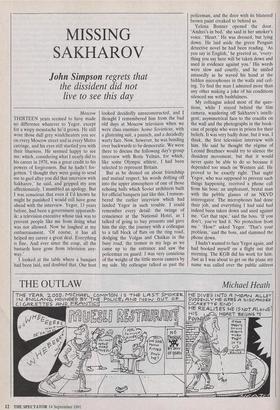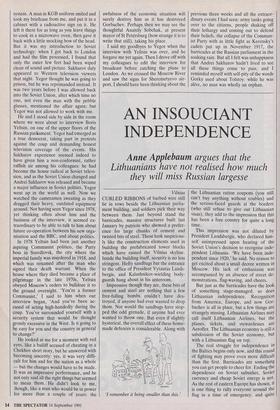MISSING SAKHAROV
John Simpson regrets that
the dissident did not live to see this day
Moscow THIRTEEN years seemed to have made no difference whatever to Yegor, except for a wispy moustache he'd grown. He still wore those dull grey windcheaters you see on every Moscow street and in every Metro carriage, and his eyes still startled you with their blueness. He seemed happy to see me; which, considering what I nearly did to his career in 1978, was a great credit to his powers of forgiveness. But he hadn't for- gotten. 'I thought they were going to send me to gaol after you did that interview with Sakharov,' he said, and gripped my arm affectionately. I mumbled an apology. But I was conscious that even if I'd known he might be punished I would still have gone ahead with the interview. Yegor, 13 years before, had been a government apparatch- ik: a television executive whose task was to prevent people like me from doing what was not allowed. Now he laughed at my embarrassment. 'Of course, it has all helped my career a great deal. Everything is fine. And ever since the coup, all the bastards have gone from television any- way.'
I looked at the table where a banquet had been laid, and doubted that. Our host looked decidedly unreconstructed, and I thought I remembered him from the bad old days at Moscow television when we were class enemies: homo Sovieticus, with a glistening suit, a paunch, and a decidedly warty face. Now, however, he was bending over backwards to be democratic. We were there to discuss the following day's group interview with Boris Yeltsin, for which, like some Olympic athlete, I had been selected to represent Britain.
But as he droned on about friendship and mutual respect, his words drifting off into the upper atmosphere of one of those echoing halls which Soviet architects built for official banquets just like this, I remem- bered the earlier interview which had landed Yegor in such trouble. I could remember every detail: the twinge of conscience at the National Hotel, as I talked of going to buy presents and gave him the slip; the journey with a colleague to a tall block of flats on the ring road, dodging the Volgas and Chaikas in the busy road, the tremor in my legs as we came up to the entrance and saw the policeman on guard. I was very conscious of the weight of the little movie camera by my side. My colleague talked us past the
policeman, and the door with its blistered brown paint creaked to behind us.
Yelena Bonner opened the door. 'Andrei's in bed,' she said in her smoker's voice. 'Heart.' He was dressed, but lying down. He laid aside the green Penguin detective novel he had been reading. 'As you say in English,' he greeted us, 'every- thing you say here will he taken down and used in evidence against you.' His words were slow and courtly, and he smiled amusedly as he waved his hand at the hidden microphones in the walls and ceil- ing. To find the man I admired more than any other making a joke of his conditions silenced me with bashfulness.
My colleague asked most of the ques- tions, while I stayed behind the film camera, wandering off Sakharov's intelli- gent, asymmetrical face to the crucifix on the wall and the photographs in the book- case of people who were in prison for their beliefs. It was very badly done, but it was, I think, the first television interview with him. He said he thought the regime of Leonid Brezhnev would try to silence the dissident movement, but that it would never quite be able to do so because it depended too much on Western aid. He proved to be exactly right. That night Yegor, who was supposed to prevent such things happening, received a phone call from his boss: an unpleasant, brutal man with the pebble glasses of an NKVD interrogator. The microphones had done their job, and everything 1 had said had indeed been taken down and used against me. 'Get that tape,' said the boss. 'If you don't, you've had it. No protection from me.' How?' asked Yegor. 'That's your problem,' said the boss, and slammed the phone down.
I hadn't wanted to face Yegor again, and had booked myself on a flight out that morning. The KGB did his work for him. Just as I was about to get on the plane my name was called over the public address system. A man in KGB uniform smiled and took my briefcase from me, and put it in a cabinet with a radioactive sign on it. He left it there for as long as you leave things to cook in a microwave oven, then gave it back with a little mocking bow of the head. But it was my introduction to Soviet technology: when I got back to London and had the film processed, I found that only the outer few feet had been wiped clean of sound and picture. Sakharov duly appeared to Western television viewers that night. Yegor thought he was going to prison, but he was reprimanded instead. it was two years before I was allowed back into the Soviet Union, after which time no one, not even the man with the pebble glasses, mentioned the affair again; but Yegor was not allowed to work with me.
He and I stood side by side in the room where we were about to interview Boris Yeltsin, on one of the upper floors of the Russian parliament. Yegor had emerged as a true democrat, taking part in protests against the coup and demanding honest television coverage of the events. His Sakharov experience seemed indeed to have given him a non-conformist, rather raffish air among his colleagues: he had become the house radical at Soviet televi- sion, and as the Soviet Union changed and Andrei Sakharov was released and became a major influence in Soviet politics, Yegor went up in the world as well. Now we watched the cameramen sweating as they dragged their heavy, outdated equipment around. Not having seen Yegor since 1978, yet thinking often about him and the business of the interview, it seemed ex- traordinary to be able to talk to him about future co-operation between his new orga- nisation and the BBC, and about politics.
In 1978 Yeltsin had been just another aspiring Communist politico, the Party boss in Sverdlovsk, the city where the imperial family was murdered in 1918, and which was renamed after the man who signed their death warrant. When the house where they died became a place of pilgrimage in the late 1970s, Yeltsin obeyed Moscow's orders to bulldoze it to the ground overnight. `You're a former Communist,' I said to him when our interview began, 'And you've been ac- cused of acting high-handedly during the coup. You've surrounded yourself with a security system that would be thought grossly excessive in the West. Is it going to be easy for you and the country in general to change?'
He looked at me for a moment with red eyes, like a bailiff accused of cheating in a Chekhov short story, but he answered with becoming sincerity: yes, it was very diffi- cult for him, and for the nation as a whole — but the changes would have to be made. It was an impressive performance, and he not only said all the right things but seemed to mean them. He didn't look to me, though, like a man who would be in power for more than a couple of years: the
awfulness of the economic situation will surely destroy him as it has destroyed Gorbachev. Perhaps then we may see the thoughtful Anatoly Sobchak, at present mayor of St Petersburg (how strange it is to write that still), taking his place.
I said my goodbyes to Yegor when the interview with Yeltsin was over, and he forgave me yet again. Then I drove off with my colleagues to edit the interview for broadcast before catching the plane to London. As we crossed the Moscow River and saw the signs for Sheremetyevo air- port, I should have been thinking about the previous three weeks and all the extraor- dinary events I had seen: army tanks going over to the citizens, people shaking off their lethargy and coming out to defend their beliefs, the collapse of the Commun- ist Party with as little fight as Kerensky's cadets put up in November 1917, the barricades at the Russian parliament in the soaking rain. But all I felt was unhappiness that Andrei Sakharov hadn't lived to see all these things come to pass, and I reminded myself with self-pity of the words Gorky used about Tolstoy: while he was alive, no man was wholly an orphan.



















































 Previous page
Previous page